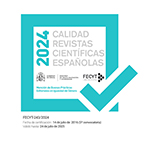Seguridad Social brasileña y Trabajo Social: consideraciones sobre el Beneficio de Prestación Continua
Resumen
La seguridad social brasileña, garantizada por la Constitución federal de 1988, comprende los derechos relativos a la salud, previsión social y asistencia social. El Beneficio de Prestación Continua (BPC) fue aprobado en los objetivos de la política de asistencia social y está regulado por la Ley Orgánica de Asistencia Social de 1993. Esta prestación garantiza un salario mínimo mensual a las personas con discapacidad y a las personas mayores. Para acceder a esta ayuda los requisitos que hay que cumplir son: la evaluación médica y social de la persona con discapacidad, la edad de 65 años para la persona mayor, y para ambos, la renta per capita del núcleo familiar, cuyo valor ha de ser inferior a la cuarta parte del salario mínimo. Con la regulación del BPC se han producido avances y retrocesos en la legislación y en su ejecución, de ahí que este artículo se propone presentar: una reflexión teórica, el análisis de la legislación sobre la temática y algunas consideraciones sobre los desafíos que se plantean para los trabajadores sociales.Descargas
Descarga artículo
Licencia
La revista Cuadernos de Trabajo Social, para fomentar el intercambio global del conocimiento, facilita el acceso sin restricciones a sus contenidos desde el momento de su publicación en la presente edición electrónica, y por eso es una revista de acceso abierto. Los originales publicados en esta revista son propiedad de la Universidad Complutense de Madrid y es obligatorio citar su procedencia en cualquier reproducción total o parcial. Todos los contenidos se distribuyen bajo una licencia de uso y distribución Creative Commons Reconocimiento 4.0 (CC BY 4.0). Esta circunstancia ha de hacerse constar expresamente de esta forma cuando sea necesario. Puede consultar la versión informativa y el texto legal de la licencia.









